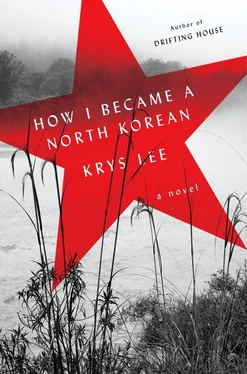Yongju gave them a tin of stream water he had collected that afternoon and had them sit close to the fire. But as the others began to yawn, the couple hovered, waiting, until the halmeoni finally said, “If you have a shelter, and we could stay, just for the night…”
Yongju lowered his head. “We have no room. I’m sorry.”
I recoiled with shame. The harabeoji bled and the halmeoni cried, but wanting to agree with the others, I stayed quiet. And I called myself a Christian. I was beginning to ask myself what that really meant.
Before we crawled back into our dugout, we roughed up the bed of pine needles and leaves behind us and erased our tracks, then pulled the camouflaged screen over. When I closed my eyes that night, I saw the man’s bleeding mouth, the frightened pits of his eyes. In the morning my wish had come true. Jangmi was gone. She had taken every lightweight, useful item in our shelter with her.
These were my first images of the safe house: The gas lantern that Missionary Kwon had me raise above our heads that turned us into skulls without bodies, as he introduced us to our caretaker Missionary Lee. Missionary Lee’s ink-smudged fingers sweeping across his face and the blue streak they left on his nose. The voices of trees caressing the two-story brick building. The boys’ faces glowing with hope.
Missionary Kwon had driven us past a town that thinned into a desolate fringe of construction projects, a rusted crane, then whittled down into barren country roads. One road led to a bridge built across a trickle of a stream to a gate, behind which was our building. Though I was a storm of feeling, the night was as calm and cool as a sheet of glass. The yard of weeds as thick as a vagabond’s stubble. Then we were shuttled up exposed cement blocks that served as stairs into a common room, down a narrow corridor, and into the few unfinished rooms that we would live in.
Daehan said, “Wait for me!” though there was nowhere to go, and scrambled to my side. As if I could protect him. As if I could protect anyone.
Missionary Kwon extended his arms, his smile as heavy as a large stone. He told us that this God of theirs loved us. “You see?” he said. “God always provides.”
In the lantern’s light, he gave us a lengthy introduction to Missionary Lee.
“I’m so happy to see you all here safe!” Missionary Lee’s voice was so frail that it seemed to sink into his elephantine girth. “I’ve been praying for you every day since Missionary Kwon told me about you.
“You must be Yongju, and you Daehan, and you Bakjun.” As he called out our names one by one, he embraced each of us though our clothes were crusty and we stank of alcohol.
“I’ll have to document this.” Missionary Kwon directed us to stand against a slab of scarred concrete and pulled out a camera from his bag.
I felt as if I were in a war movie, a prisoner with infested hair about to be executed by American soldiers. Which reminded me of my eomeoni . Everything reminded me of my eomeoni .
“You think I like this?” Missionary Kwon said, though no one had said anything. “Sponsors want evidence. There’s not a thing we can do about it.” He took several photographs and encouraged us to look solemn through the camera’s clicking.
Late that night after we had our first baths, he took another set of photos of us cleaned up and told us to smile. The camera — the first time I’d seen such a camera — spat out squares of glossy white paper that turned into our ghostly images within minutes. The boys crowded around to see themselves, the same way they had after Missionary Kwon had taken photos of us in the mountains. Namil was grinning in nearly every shot, but his eyes stayed mournful, and Cheolmin’s skin was flaky and reptilian, but my image alarmed me most. My gaze was gaunt, ashen; loss had passed over my face and I had become a different person.
• • •
In the safe house the clock showed me what time it was, the calendar I marked off each day told me the date. I saw time passing as spindly leaves formed on the oak trees surrounding the building. The sun and the moon swept into the room where the dozen yo we slept on were folded and stacked in the corner, still bearing the imprint of our bodies. I tried to think of the sun as a promise, a daily present that broke through the trees. I dreaded the rising moon, a time when all the people I had lost returned to me.
In the safe house there was always Missionary Lee and occasionally Missionary Kwon. Kwon was the actual God that filled our days. He had our rotten teeth pulled and ragged fingernails cleaned up, the loamy smell thick on our skin scrubbed away, until he disappeared to manage another dozen shelters. I knew power, had grown up around its black suits and unhurried air and tinted car windows. This somber man never strained to get our attention; we moved according to his wishes. I began hearing the measured rhythm of his voice in my dreams.
There was so much to do in the safe house, and so much that had been invented for us to do. There was the hall to sweep every morning after sunrise prayer. We took care not to snag our house slippers on the unfinished cement floor and gazed out the door’s eyehole, fearing a stranger’s eye would meet ours though no one was ever there. We tried that door a dozen times a day though we knew it was locked from the outside — to protect us, they said — and collected trash since most of it could be reused. We recycled leftovers from breakfast for lunch and what was left from lunch for dinner.
We, we, we — that was what I had become.
Still I felt attached to this little nothing — the square of light, the faint comfort of meat bone soup, the freedom from the dank cave — this remote promise that someday my life would matter again, just a little, to me.
We were finally safe.
I woke up before the sun was out, surrounded by boys’ bodies twisted together like pretzels. Most important, Yongju’s back was inches from me. Like every morning during our month in the safe house, his warm, nutty smell enveloped me before I opened my eyes.
Sure, you could have built another Mount Sinai with the total sum of our discomforts. But I’d gotten used to the bucket for a bathroom, the lack of electricity, Missionary Lee’s two-tiered snores that drilled straight through the wall, and the random scream and gnashing of teeth from the boys. But I was still surprised when I woke up to Missionary Kwon’s broad chin and the waft of his pine needle soap. His weekly appearances at the safe house fell on random days, and when his looming shadow shook me by the shoulder, I wasn’t prepared and I slapped away his hand.
It clamped down on mine. He said, “Wake up, there’re supplies, and I’ve set up the bath.”
I crawled upright, wanting yet dreading the bimonthly bath ritual, myself knuckled into the first floor’s pink tub pulled out from beneath cardboard boxes. There I would be, folded into what had probably held a frothing vat of kimchi.
When he moved away to wake up Yongju, the room became musky again with the scent of boys. It brought me to my senses, and I immediately bowed my head until the other boys were awake. I’d practically grown up in the church and I was determined to stay inside the maps I understood, reliable black-and-white ones of Christian and heathen, the right route and the wrong. My maps didn’t include school or family anymore.
I followed the others down the concrete steps slick from last night’s rain. The air choked with pollutants was still a welcome contrast to our room, which smelled like you had your nose up an armpit. None of it bothered me much. I was awed by their uncomplicated, generous acceptance of me. Shut up in that hermetically sealed building, I expected nothing less than to be reformed by the missionaries.
Читать дальше












